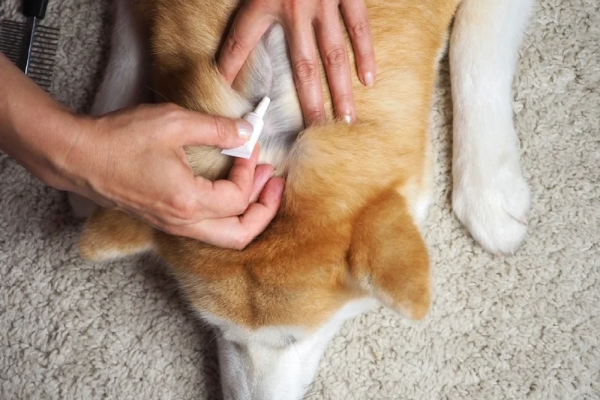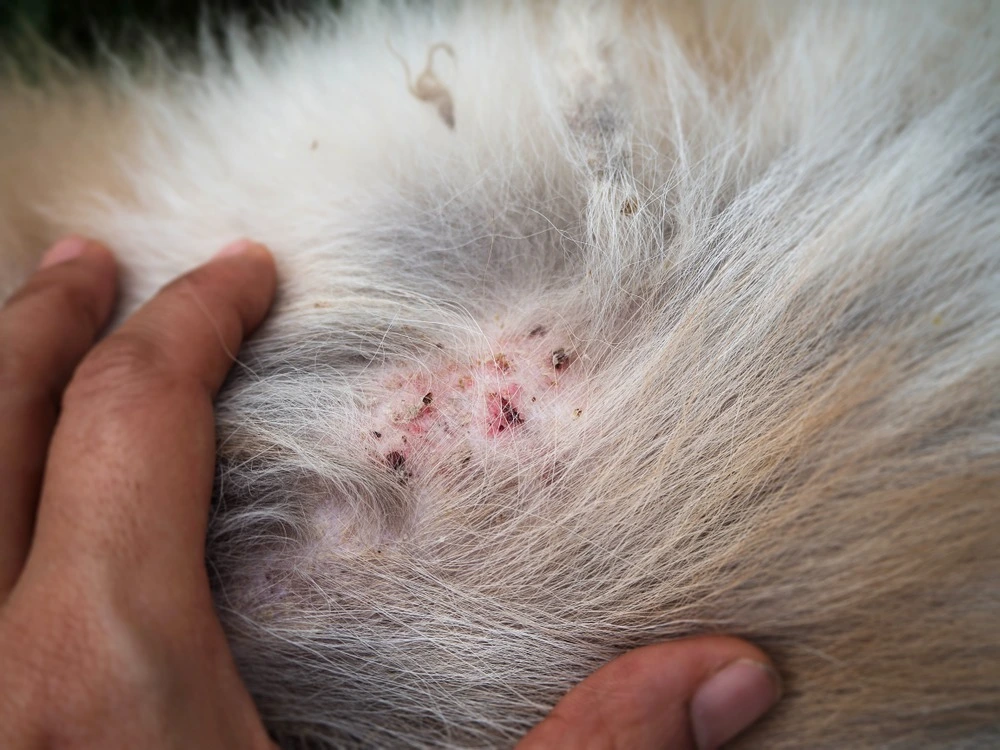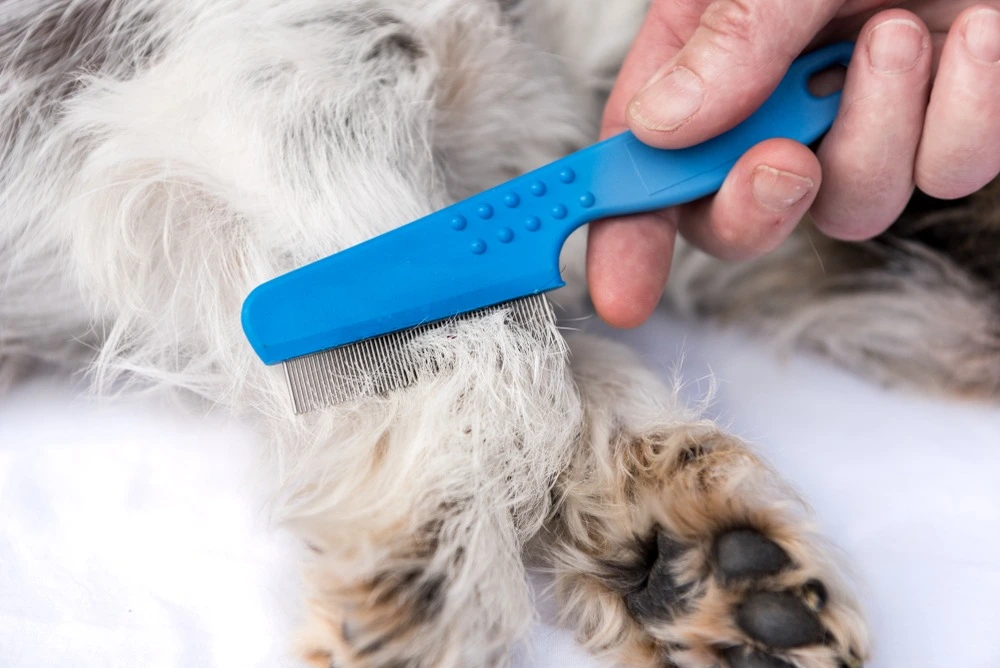
Mosquito Joe highlights the risks of flea bites for humans and pets and offers prevention tips.
|
Flea bites are itchy and obnoxious — but what can you do? If you have pets, you have to deal with flea bites. Right? Are flea bites dangerous? Surely, a few flea bites on humans are a small, albeit irritating, price to pay for the company of our beloved pets.
Unfortunately, when fleas bite your cat or dog, it can cause more serious problems than you might think for both you and your pet(s).
For people and pets who are sensitive to them, flea bites can range from irritating to maddening. Due to the pathogens they carry, diseases from flea bites can also pose serious health issues. The dangers of flea bites go well beyond skin deep. It’s vital to remain alert to how flea bites are dangerous because early detection and prompt treatment are critical to preventing potential complications. Let’s take a closer look so you can devise the best protection for you and your pets.

Flea Bites on Pets: Signs and Risks
Because some flea bites are dangerous, it’s essential to recognize them. When a person, cat, or dog is bitten by fleas, the critter injects a small amount of saliva into the skin while it feeds on the victim’s blood (sorry!). The saliva contains specific proteins that can trigger an allergic reaction in some people and pets. The bite swells, and the immediate area around the flea bite can become red, itchy, and inflamed. Worse — fleas don’t just bite once and go on their way. They can bite multiple times, especially if they are disturbed while feeding. A flea bite rash occurs when a flea bites several times in close proximity, making the itchy inflammation worse, even for those who are not allergic. That inflammation drives constant scratching, which risks skin infections.
The dangers of flea bites include skin infections, allergic responses to the bites, and the possibility of contracting disease from flea bites. If your cat or dog is bitten by fleas, it’s essential to monitor them to be certain the bites don’t become infected or worse.
Flea bites indicate it’s time to level up your efforts to get fleas off your pets, protecting them and yourself. The first place to eradicate fleas is to directly treat your pet, the most susceptible host to the nasty biters. These are the best ways to protect your pet from the dangers of flea bites:
- Consider using flea collars as part of a multi-pronged flea prevention approach.
- Look into monthly, topical flea treatments that can kill adult fleas and eggs.
- Prevent your pets from spending time in flea-infested locations.
- If you have a yard, schedule a barrier treatment to effectively reduce the risk of flea and tick bites.
- Limit wildlife access to your property where your pets spend time.
- Brush pets regularly using a flea comb.
- Use a topical flea spray to kill fleas removed by the comb or for spot treatments where your pet scratches.
- Bathe pets regularly using flea shampoo. Check your pets’ sensitivity to specific products, as some pets react adversely to certain shampoo ingredients.
These steps are the best start to protecting your pets from the dangers of flea bites. Of course, pets aren’t the only ones who need protection.

Are Flea Bites Dangerous for Humans?
Flea bites on humans can be as itchy, irritating, and even dangerous as on pets. On people, flea bites are small, red, raised bumps that are firm to the touch. They occur most frequently on the legs, particularly the feet, ankles, and calves. Fleas typically bite repeatedly, in a straight line, or in a cluster of bites.
Like our pets, we are prone to allergic reactions and contracting disease from flea bites. Even when we don’t get sick, the bites are itchy and can be painful. There are multiple ways to treat flea bites on people. First, wash the bite with soap and water to help prevent infection. Then, consider these treatment options:
- Apply a cold pack to reduce swelling, itching, and pain.
- Apply a topical anti-itch cream with calamine or pramoxine.
- Take an antihistamine to combat itching and swelling.
- Take oral steroids if swelling grows severe.
- Make a meat tenderizer paste and apply to the bite.
Meat tenderizer paste includes papain, an enzyme that breaks down the proteins and toxins in bug bites. If a meat tenderizer is not available, try using baking soda, Epsom salt, or a paste made from crushed aspirin and water.
Important Note: These treatment options only work on the symptoms of the flea bites themselves. They do not treat or prevent disease from flea bites.

Diseases and Illnesses Caused by Flea Bites
The most common flea-borne disease is flea allergy dermatitis. It is an immunologic disease caused by an allergy to the fleas’ saliva and is both a common and serious danger of flea bites. Flea allergy dermatitis can be severe for people, cats, and dogs bitten by fleas. The symptoms include:
- Intense itching all over the body
- Red, oozing lesions called hot spots
- Skin inflammation
- Hair loss
- Painful scabs
Dogs and cats afflicted with flea allergy dermatitis are driven to scratch, lick, chew, and bite at their itchy skin, even tugging out tufts of fur to relieve the itching and discomfort. Frustratingly, the only effective treatment for this flea-borne disease is to completely eliminate the flea bites by removing the biters from your pet, your home, and your yard.
Thus far, we have focused on the dangers of flea bites themselves. Because some people and animals are allergic to flea saliva, any bite can harm their health. But what if the flea is infected? That pathogen, too, enters the wound along with the saliva. So, each new host, whether a person or pet, can be infected with whatever disease or bacteria the flea carries.
Additional dangers and diseases from flea bites include:
- Bartonella is a group of bacteria that can cause multiple infectious diseases in people and pets. It causes cat scratch fever and is associated with severe conditions, including heart disease, eye inflammation, and seizures.
- Flea bites can result in a tapeworm developing in your pet’s intestines. This can cause weight loss, lethargy, vomiting, diarrhea, and an itchy anus, leading to pets “scooting” along on their rear.
- Anemia can result from flea bites when the biter drains an animal’s blood faster than they can replace it. People and pets can get anemia from flea bites, but it is more common in pets. Anemia in pets can cause weight loss, loss of appetite, trouble breathing, vomiting, weakness, lethargy, and rapid heart rate.
Prompt attention is vital when responding to infections, allergies, or diseases from flea bites, but what signs should you be looking for? Seek medical attention for any person bitten by a flea who demonstrates any of the following symptoms:
- If the bite swells, develops pus, or becomes very tender or quite warm, it is likely infected.
- If the person breaks out in hives, develops labored breathing, or becomes frantic with the itching and unable to sleep, they are having an allergic reaction to the bite.
- If the person develops a fever, headaches, muscle pain, swollen lymph nodes, or flu-like symptoms, they may have contracted a fleas-borne disease.
If your cat or dog is bitten by fleas, any of the following signs indicates that you should see your veterinarian immediately:
- If your pet’s skin becomes inflamed, develops sores, or shows signs of infection like bleeding or pus, it is a likely infection.
- If your pet seems lethargic, unwilling to play, has pale gums, rapid heart rate, facial or jaw swelling, or black stools, they may have anemia.
- If your pet develops fever, sore muscles, swollen lymph nodes, vomiting, diarrhea, coughing, labored breathing, chills, nose irritation, or fainting, they have the symptoms of a disease from flea bites.
Untreated flea bites can lead to serious long-term health impacts for both people and pets. In people, constant scratching may result in infections like cellulitis, while allergic reactions can cause chronic skin conditions. Flea-borne diseases, though rare, can cause severe complications if left untreated.
For pets, untreated bites can lead to flea allergy dermatitis, anemia due to blood loss, and the transmission of diseases like Bartonellosis and tapeworms, potentially resulting in long-term health problems or even life-threatening conditions.
Preventing Flea Bites and Infestations
The only way to completely avoid the dangers of flea bites is to entirely eliminate fleas from your property, pets, and home. Above, we discussed the many steps required to eliminate fleas on your pet. However, without removing the biters from your home and yard, you’ll just get more flea bites on your pets, and soon, you. Let’s see what you can do to prevent fleas from infesting your home and yard.
Preventing Fleas in Your Home
Preventing fleas in your home largely depends upon keeping them off your pets and your property. However, once a single flea enters your home, you’re likely to get many more. The following care will help keep fleas out of your home:
- Sweep and vacuum frequently and well. Vacuum carpets, rugs, and sofa cushions. Empty the vacuum outdoors so living fleas and viable eggs don’t get back in.
- For serious flea infestations, steam-clean carpets to kill adult fleas and their eggs.
- Wash the bedding, yours and your pet’s, frequently.
Preventing Fleas on Your Property
Avoiding the dangers of flea bites relies most heavily on keeping fleas off your property and away from your pets. The following steps will help keep your property free from biters:
- Mow your grass frequently.
- Avoid over-watering your lawn and landscaping.
- Fix any irrigation leaks and leaky faucets.
- Treat dog houses and dog runs with insecticide for fleas.
- Keep weeds, fallen leaves, and garden litter off your property.
- Keep wildlife away from your property. That’s where fleas come from.
- Do not store food outdoors.
- Keep tight lids on trash cans.
- Regularly schedule professional flea control treatments.
For ongoing protection from fleas, we highly recommend the following products:
- Monthly topical flea treatments for pets
- Flea combs
- Topical flea spray for pets
- Indoor flea sprays containing permethrin or methoprene
- Diatomaceous Earth
- Beneficial Steinernema Carpocapsae nematodes (SC)
- Professional flea control treatments
When to Consult a Professional for Flea Control
Sometimes, environmental flea control is essential to stop potentially harmful flea bites.
The most effective flea control cuts off fleas’ access to your pets, but this isn’t always practical. Some pets are sensitive to flea collars and topical flea treatments. Meanwhile, even once you kill the adult fleas biting your pet, more trouble could be lurking. Eggs and immature fleas in your home and on your property can take months to mature to the blood-sucking stage. Ugh! So, environmental flea control measures become critical.
Professional flea control service providers understand the complex flea life cycle and work to break it. Your service professional comes to your home armed with the tools to kill adult fleas and their eggs. They target all the spots where fleas like to hide, treating your plants, dog runs, kennels, and any place where fleas are prone to shelter. They should also examine your property for vulnerabilities, including breaks in the fencing that allow wildlife to enter, broken irrigation causing damp spots, and other ways you may be attracting or harboring fleas.
Often, the best way to eliminate flea bites on humans and pets is through a comprehensive approach. Topical dog flea bite treatments, together with home hygiene and an environmental flea control like Mosquito Joe®, can help you tame an infestation.
Contact Mosquito Joe for Effective Flea Control
While fleas and the dangers of flea bites are common problems for pets and their parents, you don’t have to fight them alone! Mosquito Joe makes the outdoors fun again for both you and your pets by controlling nasty biters like mosquitoes, fleas, and ticks.
Our service professionals arrive promptly, in uniform, and driving a marked van. They have all the equipment and expertise required to effectively keep fleas, ticks, and mosquitoes away from your property. All of our work is backed by the Mosquito Joe Satisfaction Guarantee and the Neighborly Done Right Promise™️, which ensures your satisfaction.
Our barrier treatment sprays are effective at seeking out pests where they hide, live, and breed. We also offer highly effective eco-friendly pest control solutions and specialty pest services. Not only can our home pest control make your yard and garden enjoyable again for you and your pets, but we also provide tips and advice on how to protect you, your family, your pets, and your property from annoying biters.
To get started on your flea-free future, request a free quote today to help make flea bites a thing of the past.
Frequently Asked Questions About Flea Bites
Since 2010, Mosquito Joes has been protecting families like yours and their pets from the dangers of flea bites. As industry leaders devoted to our client’s safety and environmental stewardship, we believe it’s vital that we address common concerns and clear up popular misconceptions. We’re happy to provide evidence-based answers to your questions about flea bites and how to avoid them.
Should I be worried if a flea bites me?
While all flea bites are itchy and annoying, most do not transmit disease. To play it safe, it’s important to remain alert to developing symptoms of allergic reactions or disease. Don’t scratch the bite, which can cause it to become infected. You should definitely seek medical attention if you experience trouble breathing or develop a fever, headache, muscle pain, or flu-like symptoms.
What happens if you leave flea bites untreated?
Although flea bites can transmit disease, most don’t. However, untreated disease-free flea bites can cause significant problems for people and pets. Multiple untreated flea bites can lead to flea allergy dermatitis, which can make us and our pets truly miserable.
Can fleas live on human hair?
While fleas might jump onto your hair, they will soon jump away, since it does not provide the dense cover they need. Most flea species don’t even feed on humans. A flea in your hair will be looking for an animal to provide better feeding and shelter.
This article is intended for general informational purposes only and may not be applicable to every situation. You are responsible for determining the proper course of action for your home and property. Mosquito Joe is not responsible for any damages that occur as a result of this blog content or your actions. For the most accurate guidance, contact your local Mosquito Joe location for a comprehensive, on-site assessment.
